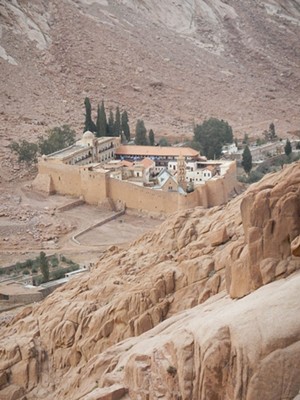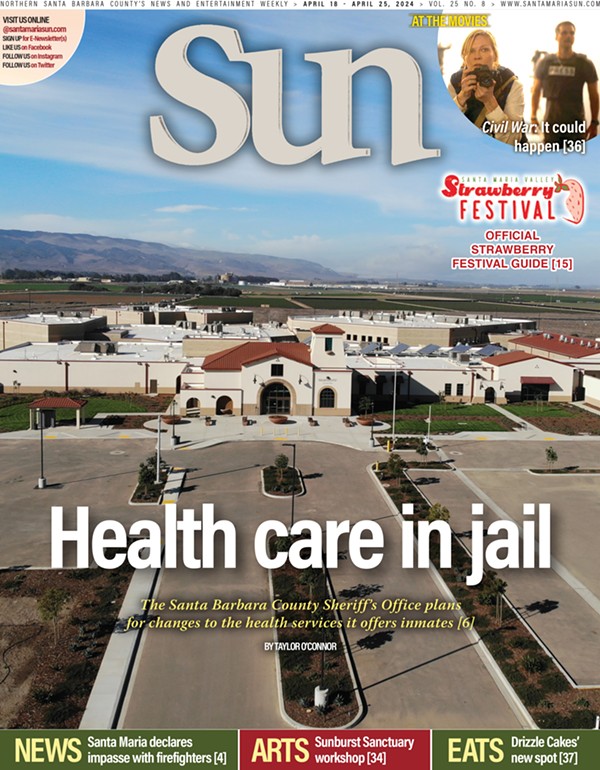A fourth century Christian saint once declared, “The world is a book … and those who do not travel read but one page.” Over the years, my eleemosynary wanderlust has led me to many remote, intriguing, and tumultuous places. And true to the adage, each peregrination added a page to my understanding of our world. One particularly brief but illuminating excursion contributed an entire chapter to my worldview, and sparked insight into solutions to the scourge of sectarian violence.
In 2013, I journeyed to St. Catherine’s Monastery, an ancient citadel at the foot of Mount Sinai, in Sinai, Egypt. As one of Christendom’s oldest continuously operating monasteries, dating back to just three centuries after Christ, St. Catherine’s is steeped in Orthodox Christian tradition, and cloaked from the world by its stillness and obscurity. Also holy to Jews and Muslims, the site has special significance, as it houses religious relics venerated by each of the Abrahamic faith traditions. The burning bush, where Moses spoke to God; the relics of St. Catherine; and the Achtiname (the Contract of Muhammad) are all housed within the sacred walls of this tranquil and sacred place.

The intimate details of each of these antiquities were foreign to me, until my visit to Sinai. In fact, I came to first learn of the existence of the Achtiname from a fellow emergency physician, Dr. Paul Georghiou, an adherent of the Greek Orthodox faith. It is a sad confession, that in more than 30 years as a practicing Sunni Muslim, though raised with the themes of religious tolerance, I had never heard of the Achtiname and its profoundly important message. But upon perusing its text, and having the fortune of meeting Elder Pavlos, one of the Christian keepers of this Islamic document, it became a religious imperative to visit St. Catherine’s and attempt to add a page to my book.
Anointed by an austere lifestyle and the remote stillness of the Sinai desert, Elder Pavlos, like the other monks of St. Catherine’s Monastery, was a living example of Christ himself. These gentle men were entirely selfless, humble, loving, hospitable, and surprisingly some of the most jovial and humorous people that I have ever encountered.
During my dozen or so days at St. Catherine’s monastery, I taught CPR, AED use, and basic first aid skills to the monks. I also served their medical needs. They, in turn, generously hosted our team, and gifted us Sinai honey, a rare and precious elixir. Moreover, they imparted ancient and invaluable wisdoms. The insights retrieved during 12 days in Sinai will take me decades to digest and implement in own my life.
The relationship between the monks and the Bedouins who lived in the desert surrounding Mount Sinai was shaped by the teachings of both Christ and Muhammad. The monks demonstrated the adage, “Do unto others as you would have others do unto you.” Two thirds of all donations made to the monastery found their way to serving the needs of their poor Bedouin neighbors. In turn, the Bedouins lived the teachings of Muhammad. They protected the Monastery and the holy monks residing within. The Bedouins would even provide convoys to accompany the monks on their travels. During the recent political upheaval in Egypt, the Bedouins blocked off mountain passes and set up sentries to assure that ill-meaning troublemakers could not make their way into the region to cause harm and havoc. The devotion of the Bedouins exceeded the simple phenomenon of “do unto others,” as Christ taught, or “harm no one, so no one will harm you,” as the Prophet Muhammad had instructed. Understanding the Bedouins’ intense dedication to the monks of St. Catherine’s monastery was demystified by a reading of the Achtiname, a pact made between the Prophet Muhammad and the forbearers of the monks who reside there today. Additionally, many of the Bedouin were the descendants of Roman guards who had been sent to protect the Monastery in generations past.
The Achtiname was dictated by the Prophet Muhammad (sws) around the year 628, and scribed by the hand of Ali ibn Abu Talib, the Prophet’s son-in-law. It is said that the handprint of the Prophet himself was indelibly placed upon the scroll, as an eternal seal and as a commitment to the support and protection of Christians far and wide. In 1517, the Achtiname was acquired by the Ottoman Empire under Sultan Selim I. The Ottomans respected the agreement with the monks and assigned scribes who drafted copies that were returned to the monastery. The original Achtiname was delivered to the Topkapi palace in Istanbul, and stored with many other age-old relics. I can personally attest to the existence of these documents, as I had the distinction of holding one of the surviving copies of the Achtiname in my hands. The opportunity arose, as the parchment was undergoing a restoration by Father Justin, an American monk, during my stay at the monastery.
A translation of the Achtiname reads as follows: “This is a message from Muhammad ibn Abdullah, as a covenant to those who adopt Christianity, near and far, we are with them. Verily I, the servants, the helpers, and my followers defend them, because Christians are my citizens; and by God! I hold out against anything that displeases them. No compulsion is to be on them. Neither are their judges to be removed from their jobs nor their monks from their monasteries. No one is to destroy a house of their religion, to damage it, or to carry anything from it to the Muslims’ houses. Should anyone take any of these, he would spoil God’s covenant and disobey His Prophet. Verily, they are my allies and have my secure charter against all that they hate. No one is to force them to travel or to oblige them to fight. The Muslims are to fight for them. If a female Christian is married to a Muslim, it is not to take place without her approval. She is not to be prevented from visiting her church to pray. Their churches are to be respected. They are neither to be prevented from repairing them nor the sacredness of their covenants. No one of the nation (Muslims) is to disobey the covenant till the Last Day (end of the world).”
The Prophet Muhammad’s dedication to the rights of Christians of his time is in stark contrast to the tragic and disturbing events taking place in the Middle East today. The need to reawaken these ancient commitments made by the Prophet of Islam to the followers of the Christian faith has never been more exigent.
The draconian concept of “convert, leave, or die”—reminiscent of pogroms in Europe against religious minorities—runs diametrically contrary to the ethos of Islam and the commandment found in the second chapter of the Quran, protecting freedom of religion: “La Ikraha Fi Deen” (Let there be no compulsion in faith). The contamination of Islam with malicious and misanthropic concepts such as harming others, simply because they choose an alternative sect or faith, morphs the Abrahamic faith into something horrific and no longer identifiable to mainstream Muslims as Islam. Notwithstanding this discrepancy, such expressions have become commonplace in so-called Islamic nations like Sudan, Iraq, Afghanistan, and Pakistan.
Dr. Rushdi Cader M.D., F.A.C.E.P., is medical director of SLO Regional SWAT and CEO/president of STAT Inc. He lives in San Luis Obispo. Read the second half of his commentary in next week’s issue. Send comments to the executive editor at [email protected].








